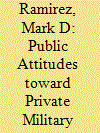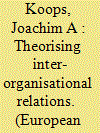| Srl | Item |
| 1 |
ID:
167370


|
|
|
|
|
| Summary/Abstract |
This article examines the distribution and correlates of mass attitudes toward the privatization of US military operations. Relying on insights from principal–agent theory, we form predictions about what beliefs are associated with a willingness to grant authority over military operations to private military companies (PMCs). The model predicts that citizens’ beliefs about actor motives, accountability, and costs are associated with attitudes toward PMCs. Using a nationally representative survey, we find that beliefs about the profit-oriented motives of private firms and perceptions of their lack of accountability reduce support for the use of PMCs, particularly in combat operations. By contrast, belief in private firms’ superior fiscal efficiency increases support for utilizing PMCs in both combat and noncombat operations. The results illustrate the usefulness of principle-agent theory for understanding mass attitudes and help to improve the field’s understanding of the contours of public attitudes toward US defense policy.
|
|
|
|
|
|
|
|
|
|
|
|
|
|
|
|
| 2 |
ID:
154462


|
|
|
|
|
| Summary/Abstract |
This article explores the historical evolution of research on the “European Union (EU)–North Atlantic Treaty Organisation (NATO) relationship” since the 1950s and examines the numerous ways in which it has served as an important case study for applying and developing theory-guided and conceptual research on inter-organisational relations (IOR) in International Relations. After a dearth of policy-oriented research during the 1990s and early 2000s, a wide range of scholars have contributed to a “conceptual turn” in the study of EU–NATO during the last decade. This development, as this article will argue, not only signifies a stronger interest by scholars to understand the complex relationship between both organisations with the help of more theory-driven research, but also highlights that the EU–NATO relationship has become a “catalytic case study” in terms of inspiring conceptual experimentation and advancing efforts to theorise IOR more generally. The article provides for the first time a systematic stock-taking and analysis of the richness of concepts and theoretical debates related to EU–NATO relations research and offers scholars wider insights into the most promising approaches and analytical tools for understanding and theorising EU–NATO relations.
|
|
|
|
|
|
|
|
|
|
|
|
|
|
|
|
| 3 |
ID:
144242


|
|
|
|
|
| Summary/Abstract |
Since 2001 the World Health Organization (WHO) has been actively promoting its credentials for managing ‘global health security’. However, the organisation’s initial response to the 2014 Ebola outbreak in West Africa has attracted significant criticism, even prompting calls for its dissolution and the creation of a new global health agency. Drawing on principal–agent theory and insights from previous disease outbreaks, this article examines what went wrong, the extent to which the organisation can be held to account, and what this means for the WHO’s global health security mandate.
|
|
|
|
|
|
|
|
|
|
|
|
|
|
|
|